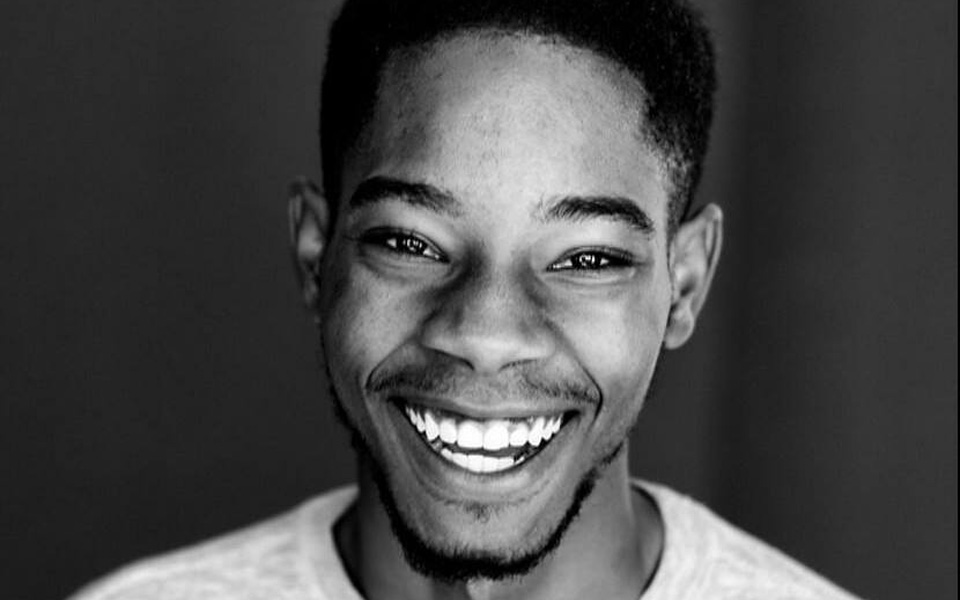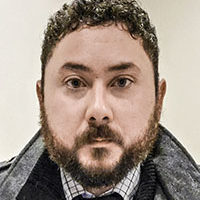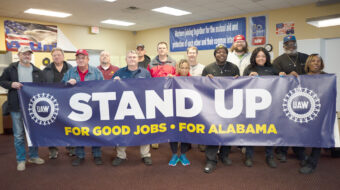
ST. LOUIS — It was déjà vu. I met Rasheen Aldridge at the same Starbucks where we had met in St. Louis’ Central West End nearly two years ago.
A lot has changed since that cold winter morning when we sat down to talk about the murder of Michael Brown and the countless number of Black lives taken by a broken system of law enforcement.
Aldridge, now 22, is organizing adjunct professors with the Service Employees International Union as part of their Adjunct Action campaign, while continuing to lead in his own community.
He laughed as he took his seat, chocolate chip Frappuccino in hand, about how strange the transition was. Rasheen started out as a Jimmy John’s employee turned “Fight for $15” fast food activist who emerged as the youngest member of the Ferguson Commission set up by the governor. He’s now a full-time union organizer.
As he spoke it was obvious that he was thinking about the future and the role young activists play in shaping the movements for social and economic justice.
Neal: What was it like being on the commission and having direct input into the report’s final recommendations?
Aldridge: It was definitely a learning experience. I was appointed shortly after the non-indictment of officer Darren Wilson. And to be honest, I wasn’t in a place, mentally or emotionally, to talk about finding solutions. I felt like there was so much more that needed to be done than just talk.
But throughout the process I realized that I was put on the committee to be a voice – not the voice – but a voice for young people.
As a youth, I realized sometimes you have to work with people or organizations you don’t always agree with. For me, knowing how to work within the system and how to change or dismantle it is good. I keep moving forward, trying to be a change agent, something desperately needed in our communities.
Neal: You worked with local law enforcement during that time. In fact, the president of the St. Louis Fraternal Order of Police, Kevin Ahlbrand, was on the commission as well. With that in mind, what’s your opinion as to whether we should abolish the current policing system or reform the existing system?
Aldridge: Many individuals call for the complete dismantling of police departments in our communities. These are often folks who have had experience with police who have gone rogue. Arguably, it’s a good old boys’ club and I understand why people want to start over completely.
But, I also get folks who want to reform the police. While all cops aren’t bad, it is a bad system that needs to change.
I find both points valid. The answer lies somewhere in the middle.
Neal: Looking at all the recommendations in the Ferguson report, is there one in particular that you would want to see immediately implemented?
Aldridge: If I had a magic wand, it would be the consolidation of all unincorporated municipalities in St. Louis County. Now, I know that this is a very complex recommendation with a lot of history, but we have to start looking at how we can stop these small towns and municipalities from purposefully targeting minorities through front yard fines, traffic tickets and speed traps, which are designed to fund their town government and disproportionately affect people of color.
If they can’t operate without abusing people in the community, then it’s a government entity that really isn’t needed. It’s definitely not helping to bridge the gap between community and police. It’s not a mystery. People know the police pull folks over and write tickets in order to generate revenue. Instead, they should be walking the beat and getting to know the residents.
Neal: Now that your role as Ferguson commissioner has ended, what’s next? You mentioned politics earlier.
Aldridge: Since then I’ve been busy fighting to increase the minimum wage here in St. Louis City, talking with different groups about the Ferguson report. More recently, I started looking at my neighborhood and comparing the racial and economic disparities here to neighborhoods right next to mine, which pushed me to throw my hat into the political arena.
I started talking to people in the neighborhood. I began holding monthly meetings. I decided to run for committeeman in the 5th ward, along with my friend Megan Betts as committeewoman.
Now, this a volunteer political position, but we became active in politics because we knew the 5th Ward needed better representation. On top of that, we wanted to challenge a political family dynasty that has been in power for too long.
Neal: A family dynasty?
Aldridge: I’m talking about the Hubbard family. This is the family that controls everything from 5th ward committeeman (Rodney Hubbard Sr.) to 5th ward Alderman (Tamika Hubbard), and up until recently the 78th state representative district (Penny Hubbard). The people in the neighborhood are tired of being ignored by a bought and paid for political family.
This is one of the reasons why Bruce Franks Jr. [See related article.] beat Penny Hubbard. He will truly represent the needs of the 78th district.
Neal: You ran a boots on the ground, grassroots campaign and on August 2, 2016 you lost to Rodney Hubbard Sr. by 55 votes. What made you decide to challenge this in court?
Aldridge: I’ve lived in the 5th ward my whole life. We all know how the Hubbards get higher absentee votes when a family member is on the ballot, especially in the December, 2011 special election. During that election, more absentee ballots were cast than people who actually went to the polling locations.
So early on we got a lawyer, and planned out how to get ahead of the potential absentee ballot fraud. We put in a sunshine [open records] request. We wanted to see where these absentee votes were coming from.
We wanted to know if they were coming from people who actually couldn’t make it to the polls and senior citizens, or if they were coming from certain apartment complexes, Hubbard strongholds.
While we were out knocking doors, we would meet people in their 20’s or 30’s and they would tell us, “Oh I already voted. Someone came by and helped me vote absentee.”
So we took it to court. We argued that voters were cheated out of a fair election. At the end of the day, the judge found that there were issues with a number of the absentee ballots and called for a special election.
Bruce had already won his special election on Sept. 16 by a huge number. My special election will take place on Nov. 8.
Neal: You and Bruce Franks Jr. challenged election fraud and won. What do you say to your critics who feel you have given the Republican party more ammunition to use as they push for voter I.D. laws?
Aldridge: Well, first, it’s unfortunate because it’s only pushing a message of a movement divided.
Second, Republicans will use whatever they can as ammunition to push their agenda. Unfortunately, some folks fell into their trap and took to Twitter and Facebook.
Bruce and I revealed corruption in local politics. Not voter fraud. The people who cast their ballots did nothing wrong. It was one campaign abusing the system and the St. Louis Board of Elections not following the law. It had to do with a corrupt political family, the Hubbards, not voters.
It’s disappointing that the local Democratic establishment did not take this opportunity to listen to grassroots voters and activists. Me and Bruce believe in creating a just and fair Democratic Party. We believe in holding the other side accountable, but we also believe in holding ourselves accountable to the voters. That’s how democracy is supposed to work.
Neal: So, on to Nov. 8 and a special election?
Aldridge: Yep, and hopefully after it’s all over I will be able to start working as a 5th ward committeeman. My goal in the first 30 days will be to hold a large community meeting and begin to connect with people from all over the ward. I want to push real change. We deserve a political system that works for everyone.

MOST POPULAR TODAY

Zionist organizations leading campaign to stop ceasefire resolutions in D.C. area


High Court essentially bans demonstrations, freedom of assembly in Deep South

Afghanistan’s socialist years: The promising future killed off by U.S. imperialism

Communist Karol Cariola elected president of Chile’s legislature






Comments